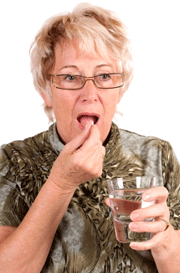 |
||||
Treatments For Depression - Best Remedies For Menopausal DepressionDepression is a complex condition which needs carefully considered treatment. Depression is not simply the result of a chemical imbalance in the brain. The chemistry of the brain does change in depression, but genetics and your environment and lifestyle are significant as well. During the menopausal years you could be under a lot of pressure from the demands of work and family. You, or those close to you, could have health issues. You could be experiencing a range of menopause signs. And all this takes place as you adjust to the shift in your life, into a new, more mature phase. It's not surprising, given that context, that midlife women can be prey to depression, and that the answer lies in considering a range of treatments and self-help tactics. If you have noticed the warning signs of depression, here is more information to help you find the best way to cope: Other treatments for depression Menopause and antidepressants
If you visit your doctor asking for treatments for depression, you'll probably be prescribed antidepressants. Although these drugs can be helpful to get you through a difficult time, they can't 'cure' depression - they can only relieve the symptoms. Be aware that certain antidepressants may cause weight gain. Research in the UK has shown that between 50-80% of people who take antidepressants have another episode of depression within three years of stopping the medication. Why this high rate of relapse? The answer is partly because depression often arises from disturbing events and changes in your life. Antidepressants can't tackle these underlying causes of depression, but they can be very effective at gradually lifting your mood enough for you to regain the energy to make changes to the way you live that will help reduce your risk of becoming depressed again. Your doctor is most likely to prescribe one of the SSRI (selective serotonin reuptake inhibitor) group of antidepressant drugs, which includes fluoxetine (Prozac). An interesting side effect of some types of SSRI for menopausal women, is that they suppress hot flushes and the effect becomes obvious after only 1-2 weeks of taking the drug. Alternatively, you might be prescribed one of the tricyclic antidepressants, such as amitriptyline (Triptafen). Here are some points to bear in mind before you decide to try a course of antidpressants:
Alongside drugs as treatments for depression, your doctor might also suggest a psychological therapy. It's also a great idea to support the effects of medication by using other strategies to manage and improve your state of mind. These are all good ways to start to deal with depression. Psychological therapiesAs well as, or instead of, drug treatment for depression, your doctor might suggest a psychological treatment - or you could organise this for yourself, without involving your physician. You might see a counsellor or a psychiatrist. Their are many approaches to talking therapies, but the fundamental idea is to look at the areas of your life that cause you difficulty or pain, and seek understanding and solutions. Talking therapies can take a long time to show results, but in the UK, you might be referred for cognitive behavioural therapy, a short-term treatment that treats emotional problems by helping you to change negative patterns of thought. Self-help treatments for depressionUse some of these simple tactics to manage your depression. If you have mild depression, techniques like these can be enough to boost your mood, and lift you out of the blues. They can also be helpful used alongside medication or one of the talking therapies. Find the techniques you enjoy, and make them part of your life into the long term. They'll help you stay well, and if you feel your emotions starting to slide downwards, can be enough to prevent you from slipping back into a depression. Depression is one of the most common illnesses of our time, and there is nothing to be ashamed of if you are feeling depressed. Seek help, tell people how your feel, and try some of these treatments for depression. There is a way out of your unhappiness so act today to help yourself feel better. Go back to the top of Treatments For Depression. Return from Treatments For Depression to How To Deal With Depression. Return from Treatments For Depression to Beat Menopause Weight Gain. |
OUR FREE REPORT!
Get the Healthy Eating Habit and Lose Weight For Ever 
We hate spam and will never give away or sell your email address |
|||
|
|
||||
FEEL GOOD IN YOUR BODY!Beat-menopause-weight-gain.com does not offer medical advice. Please consult your physician before making any changes to your usual lifestyle.View our Terms of Use and Privacy Policy |
||||
|
Beat Menopause Weight Gain - Feel Good in Your Body! - All Rights Reserved - Copyright© 2008-2012
| ||||



